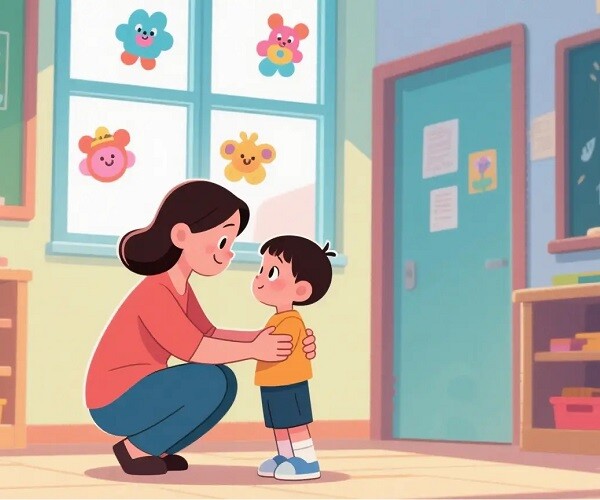Starting school is a significant transition for children, as they encounter teachers and peers and navigate unfamiliar rules. During this adjustment, children largely rely on their interactions with family members, especially their mothers, for support.
A preschooler’s adaptability and initiative are often shaped by the signals conveyed through a mother’s daily behavior.
Therefore, a mother’s everyday interactions create a nurturing and supportive environment for her child’s development, particularly in four crucial aspects.


Stable emotions provide a foundation for safety
A child is highly attuned to their mother’s emotional state and can sense even subtle changes in her feelings and behavior. When a mother maintains composure during separations and refrains from conveying anxiety, the child receives a signal that preschool is a safe place.

This stable emotional interaction helps children quickly establish a sense of basic safety in an unfamiliar setting. When children perceive their mother’s confidence and calmness, they are more likely to open up, make friends, and adapt to their new surroundings.
A mother’s ability to regulate her emotions provides children with a solid psychological anchor when facing new environments, assuring them that they have reliable support even when faced with challenges.

Children are highly perceptive of their mother’s emotional state.

Encouraging independence fosters courage
Before starting preschool, if mothers provide their children with the space to practice independence, such as allowing them to organize their belongings and choose their outfits, it strengthens their self-reliance.
This ability carries over to preschool and manifests as courage when participating in activities and tackling small problems.
Therefore, mothers should refrain from overly interfering with their children’s self-directed behaviors, enabling them to believe in their ability to face challenges in this new phase of their lives.
These moments are opportunities for children to share their experiences and for mothers to guide them in facing life’s difficulties.
By encouraging early independence, mothers lay the foundation for their children’s future confidence and adaptability. When children enter preschool with a confident and proactive mindset, they are better equipped to explore and learn effectively.

Effective communication builds a bridge for self-expression
Through daily interactions, when mothers patiently listen and provide clear feedback, children gradually master the art of expressing their needs. Mothers who pay attention to their children’s words and understand their emotions and contexts lay the groundwork for effective communication.
This model of communication continues in preschool, enabling children to confidently share their thoughts and difficulties with their teachers.
When children feel heard and understood, they become more assertive in expressing their opinions, emotions, and challenges. They realize that their expressions are valued, reducing their anxiety about having their needs overlooked.
This assurance is a crucial prerequisite for social integration. As a result, children find it easier to make friends and engage in group activities. This sense of safety fosters self-confidence, which is essential for exploration and learning in new environments.

Effective communication empowers children to express themselves without hesitation.

Positive reactions to challenges reinforce resilience
A mother’s reaction to her child’s confusion or negative emotions from preschool significantly influences their coping strategies.
Instead of avoiding issues, guiding children to describe their situations and finding solutions together helps them understand that challenges are normal and manageable.
This approach becomes internalized in children’s psychological mechanisms, prompting them to proactively address problems instead of retreating when faced with similar situations at preschool.
Preschoolers’ confidence stems from the psychological resources accumulated through daily interactions with their mothers. These resources encompass a sense of safety, self-determination, communication skills, and problem-solving abilities.
When equipped with these resources, children naturally exhibit composure and bravery in new environments. They understand that any difficulties they encounter can be overcome with feasible solutions and their family’s support.

Address challenges head-on and guide your child toward problem-solving.





































